The first home store to make Indian crafts cool is tightly tied to the country’s socio-political core. Contemporary Arts & Crafts, set up by Vina Mody, continues to remain a shop with a conscience as it turns 54 this week
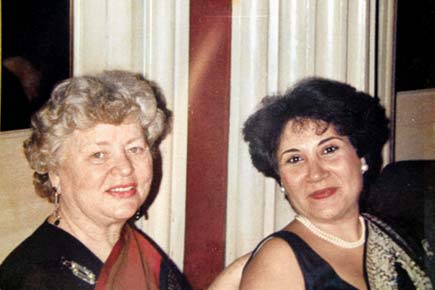
.
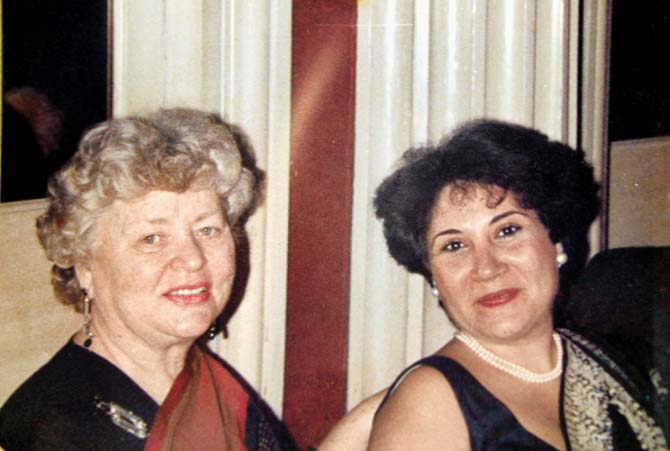
Vina and Feroza Mody at the iconic store’s 25th anniversary celebration in 1987
They were architecture students together at Berkeley. Studios in that University of California department were fitted with long tables to accommodate drawings. “There was a vacant space next to Piloo, where I parked myself — simple as that,” Vina Mody emails me. The 91-year-old American is describing how she met her husband Piloo Mody, architect, passionate parliamentarian and co-founder of the liberal Swatantra Party.
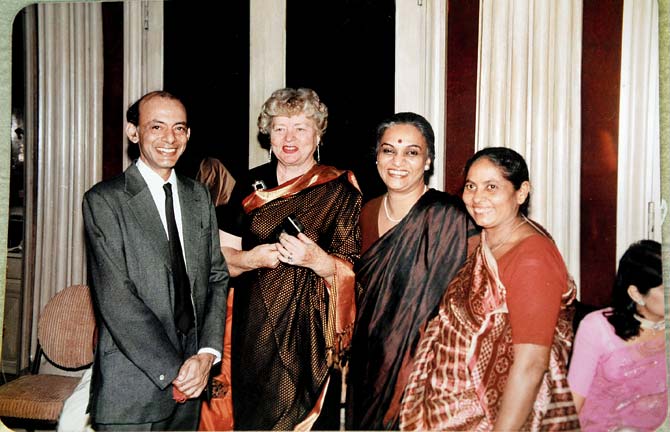
The four original CAC partners (from left) Muzaffar Ali Khan, Vina Mody, Hema Sankalia and Amritlal Mistry’s wife, Lalita
Returning to Bombay, the couple set up Mody and Colgan in 1953. Next, Vina introduced the city to Contemporary Arts and Crafts, possibly the first shop of its kind, on November 29, 1962. It was a significant date — the birthday of her mother-in-law Jerbai Mody (Piloo was industrialist Sir Homi Mody’s youngest son after Russi and Kali).
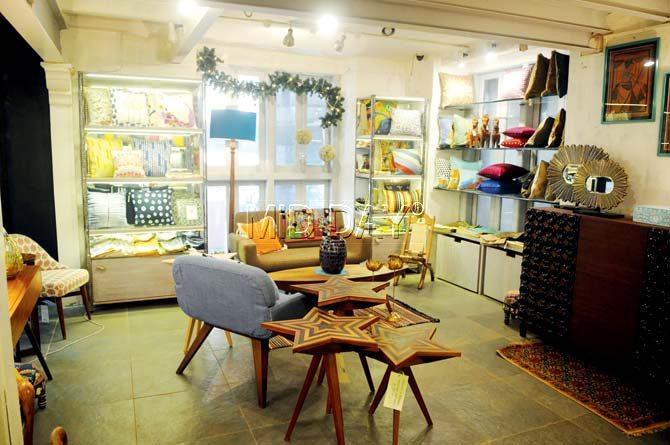
The Contemporary Arts and Crafts Store in Taj Building on DNâu00c2u0080u00c2u0088Road, Fort. Pic/Datta Kumbhar
“Piloo felt designing pretty little buildings wasn’t satisfying when the whole country was going to the dogs via the socialistic road,” Vina shares. “In 1959-’60, he became a founder member of the Swatantra Party, working for it until he died in 1983.”
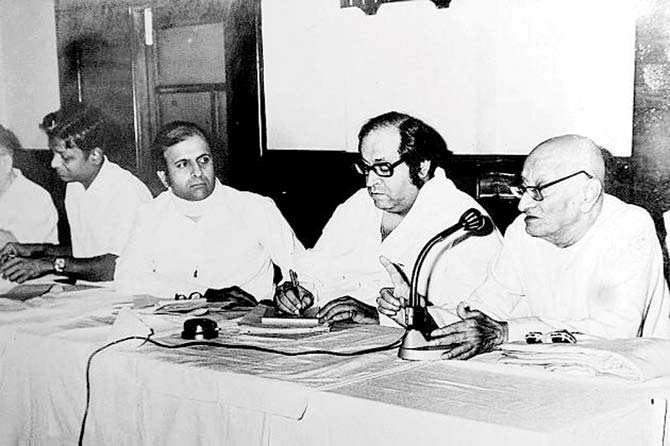
(From left) Madhu Mehta, Piloo Mody and C Rajagopalachari at the Swatantra Party meeting in 1967, Mumbai. Pic/Nitai Mehta
As Vina designed for the firm, there remained a gnawing concern. “I didn’t envision CAC, it was a real need,” she says. “We were doing interiors of flats, restaurants, banks, and needed textiles, ceramics, floor coverings, all sorts of accessories for our projects. There was nothing available in India at that point, with the British having finally pulled out.”
With stores like Evans Fraser, Whiteway Ladlow and Army & Navy shunting out, colonial Bombay was receding. Homes and offices were crying for a dynamic decor leap. Four design partners decided to sharpen focus, along with their pencils, to draw a new cultural map. Besides Vina, to prove handlooms could become heirlooms, were furniture makers Shirish Sankalia and Amrital Mistry, proprietors of Interfurn, and Muzaffar Ali Khan, the Nawabzada of Palanpur.
Vina and the Sankalias (Shirish married architect-academician Hema) were dismayed to realise it was next to impossible to locate a well-designed chair, rug and lamp from a shop. If a decorator wanted a lamp, it meant creating a lamp-stand and selecting fabric for the shade. By the time the entire look was ready, its cost had spiralled out of control.
Contemporary Arts and Crafts was born to boost a modern design sensibility. That it emerged as the forerunner of Indian lifestyle stores, besides being a design haven for thousands of discerning customers, was this small-town Nebraskan’s lasting gift to the country she came to love. “It was thrilling, the beautiful items available, the craftsmen a joy to deal with,” she exults. “We opened thanks to a friend who owned a building opposite old Customs House, the previous premises of the Bombay Natural History Museum. It was quite a climb up rickety stairs. But the price was right — no rent — enabling us to put more money into stock: furniture from Interfurn, a textile collection, lots of lamps, ceramics, cane and handmade paper items... everything ‘Made in India’.”
Ethnic chic wasn’t an aspiration until CAC chose to say it could be. Vina Mody practised the Make in India philosophy more than half a century before a prime minister namesake preached it. Her eye identified the fine skills of artisans and then trained them towards a functional aesthetic. She propagated the idea that the country’s crafts could be every bit as utilitarian as they were fashionable. Commissioning local furnishings and artefacts, she nurtured and sustained the livelihood of artisans, several of them women. More Indian than many Indians, Vina combed the country for examples of indigenous cultural ingenuity. Travelling through Gujarat, Uttar Pradesh, Orissa, Andhra Pradesh and Tamil Nadu, she engaged deeply and warmly with artisans.
Intricate chain stitch, appliqué, tie and dye, block print to screen print, are techniques CAC has always embraced and encouraged, alongside reviving traditional metal manufacture by support to artists working with dhokra, bidri and other forms of casting. Wooden lacquer-finished toys from Etikopakka in Andhra and Sawantwadi in Maharashtra, woollen throws from Kashmir, embroidered cushion covers from Kutch, cotton bed linen from Nagaland and summer quilts (dohars) from Rajasthan were also aboard.
“Vina never bargains,” her niece Feroza says with admiration. The daughter-in-law of Piloo Mody’s elder brother Kali and CAC director, Feroza started scouting for raw material and objets d’art with Vina from 2000 (the brand today belongs solely to the two of them). “She is completely connected with craftsmen. Rather than beat down their price, she’d say, ‘He’s a little guy, not out there yet.’ She had a keen sense of knowing the market pulse. If she could sell something, she took it. They understood she cared. Some of them are successful exporters in their own right now.”
Feroza remembers a sourcing trip to The Export Promotion Council for Handicrafts in Delhi. At the Moradabad glass display, they were touched to see a craftsman come up to Vina, declaring, “We are what we are because of you. You spotted my grandfather’s work.” Those moulds were lost during the Emergency when the partners ran the shop.
Elected to Parliament in 1967, Piloo’s notable contributions included the passing of a bill that led to The Architects Act of 1972, formally recognising, regulating and securing the profession. Before it, architects were clubbed with engineers. When the Modys moved to Delhi, Piloo proved outspoken enough to be among the initial Emergency arrests. The night he was picked up, his Swatantra Party friend, Madhu Mehta, telephoned an Ahmedabad reporter — one of the Emergency’s earliest leaks. Till she got a ringside view of that dark phase spent waiting while Piloo was detained for 15 months in a Rohtak jail, Vina had watched her maverick husband wear badges printed ‘I am a CIA agent’ to Parliament, not taking them off till Mrs Gandhi expressly asked him to.
“Piloo Uncle was absolutely larger than life,” Mehta’s son Nitai recollects. “He loved good food and actually breakfasted on delicious Goa curry chaawal he cooked! Visiting their Prithviraj Road home was a treat. Vina Aunty was particular about table settings. Their large round dining table was perfectly laid with flowers, beautiful crockery and cutlery. She brought her showroom instinct home, as well as the other way round comfortably. Her house (in Oakland, Nebraska) is full of handmade Indian rather than factory-made foreign fabric and collectibles. She stayed totally true to the India story CAC had started telling.” Managing trustee of the Praja Foundation, for accountability in governance, Nitai feels he owes his values to influences like his father, the Modys and Paramparik Karigar champion Roshan Kalapesi, all of whose ethics and aesthetics were inspiring.
Lauding the role Vina played in popularising everyday art, designer Anuradha Mafatlal Singh finds herself strongly stamped by CAC — “Right from our schooldays my sister and I have seen our family pick Contemporary products, from waste baskets and Warli trays to cocktail napkins and table mats. When I moved to Greenwich, I hung a mirror shaped like a colourful rooster in my daughter’s room. I still jamao dahi in their Golden Gate pottery from Pondicherry. She was “a lost soul” when CAC had to vacate its Nepeansea Road headquarters just a year short of its 50th anniversary. “Who can walk out empty-handed from Contemporary?” she poses.
My bag brimful with bric-a-brac, I smile thinking over that rhetorical question on stepping out of the CAC store on DN Road in Fort. Going across to Stadium House in Churchgate, I chat with Amy Irani at the Mody and Colgan office. The loyal secretary has sat here since 1959 – witness to high-powered meetings between the greatest activists and architects of the day, and privy to typing drafts of her employer’s cult books, Zulfi My Friend, and Democracy Means Bread and Freedom. “No one can ever have bosses like mine,” she says.
Back at my computer, I ask Vina what she believes can further fulfil Indian craftsmen’s needs. “A constant supply of electricity and marketing will help,” she replies. And hopes, with Feroza, that future generations keep promoting the cause they espouse.
Author-publisher Meher Marfatia writes fortnightly on everything that makes her love Mumbai and adore Bombay. You can reach her at mehermarfatia@gmail.com
 Subscribe today by clicking the link and stay updated with the latest news!" Click here!
Subscribe today by clicking the link and stay updated with the latest news!" Click here!








